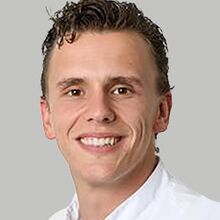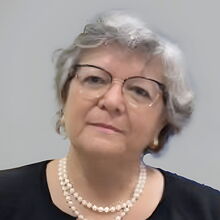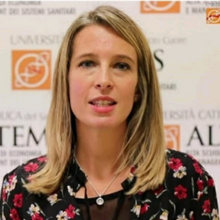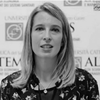Burden of acute respiratory virus infections
Burden of acute respiratory virus infections
| File | Type | Size |
|---|---|---|
| 01 - Stefania Maggi.pdf | Adobe Portable Document Format | 5.6 MB |
| 02 - Marco Goeijenbier.pdf | Adobe Portable Document Format | 4.4 MB |
| 03 - Frederica Morandi.pdf | Adobe Portable Document Format | 3.3 MB |
| 04 - Take home messages.pdf | Adobe Portable Document Format | 2.1 MB |
14 November 2023. 16:00-17:30 CET
ESWI organised a webinar addressing the burden of disease of acute respiratory virus infections. It was a follow-up to the podcast series ESWI Airborne: Burden of Disease.
Understanding and being aware of the burden of disease is important in order to gauge the impact of disease on individuals and society at large, and implementing proper policy measures addressing these risks.
Webinar chair: Colin Russell.
Guests: Marco Goeijenbier, Stefania Maggi and Federica Morandi.

Nationality: American, British
Position: Professor of Applied Evolutionary Biology, University of Amsterdam Faculty of Medicine
Research field: Virus Evolution
ESWI member since 2019
Colin Russell is a professor at the University of Amsterdam School of Medicine. His research focuses on the evolutionary dynamics of human respiratory viruses and the immune responses that control them. He has worked extensively on the within-and-between host evolution of influenza viruses, influenza virus vaccine composition, and issues related to diagnostic and sequencing resource allocation for virus surveillance. Professor Russell regularly advises a wide variety of international organisations, including WHO, on topics ranging from surveillance to pandemic preparedness, vaccine design, and test-to-treat programs. Colin is the Chair of the ESWI since 2023 and the Chair of the EU Steering Group on Influenza Vaccination since 2024.
- Satellite Symposium: A Shot in the Arm: Leveraging Combination Vaccines for Global Health Impact
- Competition between transmission lineages mediated by human mobility shapes seasonal influenza epidemics in the US
- Wrap up - Unpacking intervention strategies for acute respiratory viruses
- Uncovering the Contrasts and Connections in PASC: Viral Load and Cytokine Signatures in Acute COVID-19 versus Post-Acute Sequelae of SARS-CoV-2 (PASC)
- When should you take antiviral drugs?
- What is hybrid immunity?
- Scientific highlights of the 9th ESWI Influenza Conference
- Determinants of epidemic size and the impacts of lulls in seasonal influenza virus circulation
- Webinar: Immunisation & Treatment
- Burden of acute respiratory virus infections
- The Ninth ESWI Influenza Conference: Highlights
- Burden of disease - The economic and societal impact of acute respiratory viruses
- ESWI pandemic preparedness summit: where science and policy meet
- Celebrating ESWI 30 years!
- SARS-CoV-2 diagnostic testing rates determine the sensitivity of genomic surveillance programs
- test
- “Flu, COVID and RSV: How to vaccinate?” symposium at Options XI
- Using mathematical modelling to predict virus evolution and inform pandemic response
- ESWI Summit 2022: Pandemic Preparedness, Where Science and Policy Meet

Nationality: Dutch
Position: Intensivist, Spaarne Gasthuis, Amsterdam, The Netherlands; and Senior Scientist, Erasmus MC, Rotterdam, The Netherlands
Research fields: Special interest in acute care and infectious diseases
ESWI member since 2016
Marco Goeijenbier completed his Ph.D. in virology, focusing on "Haemostasis and Virus Infection," at Erasmus University Rotterdam in 2015. He currently serves as a specialist in acute internal medicine and critical care at Spaarne Hospital in Haarlem, The Netherlands. His expertise spans various aspects of infectious diseases, particularly in critical care medicine and viral infections. In addition to his clinical work, Goeijenbier holds a research position at Erasmus MC in Rotterdam, where he mentors PhD students exploring critical care medicine and viral infections. His research interests focus on severe acute respiratory infection (SARI) pathogenesis, epidemiology, and their interaction with the coagulation system.
Some of Goeijenbier’s most published articles include:
- Presence of procoagulant peripheral blood mononuclear cells in severe COVID-19 patients relate to ventilation perfusion mismatch and precede pulmonary embolism
- Determinants of vaccination uptake in risk populations: A comprehensive literature review.
- Benefits of flu vaccination for persons with diabetes mellitus.
- Early Patient-Triggered Pressure Support Breathing in Mechanically Ventilated Patients with COVID-19 May Be Associated with Lower Rates of Acute Kidney Injury
Dr. Goeijenbier is ESWI’s lead member and Chair in the Influenza Diabetes Community (IDC). The IDC connects leading diabetes, patient, scientific, and professional organizations around the common aim of protecting persons living with diabetes from influenza and other viral respiratory diseases like COVID-19.
Starting January 2023, Dr. Goeijenbier has taken on the role of Chair of Medical Research and Education at Spaarne Hospital. Furthermore, since January 2024, Marco is the Editor in Chief for Nature Springer Tropical Diseases, Travel Medicine, and Vaccines.
- The Two-Way Street: When Respiratory Viruses Meet Chronic Illness
- When Infections Meet NCDs: The Bidirectional Relationship Between Cardiometabolic Conditions and Respiratory Viruses
- If you do not test, you will not know - a focus on COVID-19
- Essential skills and career prospects for early career scientists
- Uncovering the Contrasts and Connections in PASC: Viral Load and Cytokine Signatures in Acute COVID-19 versus Post-Acute Sequelae of SARS-CoV-2 (PASC)
- Can vaccinated individuals still get COVID?
- Is it dangerous to get an influenza and COVID-19 vaccine at the same time?
- Presence of procoagulant peripheral blood mononuclear cells in severe COVID-19 patients relate to ventilation perfusion mismatch and precede pulmonary embolism
- Burden of acute respiratory virus infections
- The Ninth ESWI Influenza Conference: Highlights
- The bidirectional relationship between influenza and diabetes mellitus
- Burden of disease - Long-Covid and other post-infection syndromes
- Virus infections, blood clots and bleeding
- Spotlight on the burden of flu for people living with diabetes
- What about respiratory virus infections? Prevention for people living with diabetes in Covid times
- COVID-19 Treatment and Medication
- Influenza in persons living with diabetes: Pathogenesis and prevention

Nationality: Italian
Position: Research Director, CNR Ageing Branch, Neuroscience Institute, Padova (Italy)
Research Fields: Clinical epidemiology and geriatrics. Main focus on lifelong approach to healthy ageing
ESWI member since 2022
Dr. Stefania Maggi received her degree in Medicine and Surgery from the University of Padua, Italy in 1983. She also attended the Graduate School of Geriatrics and Gerontology from the same University until 1987 and in 1988 she received her Master in Public Health from John Hopkins University in Baltimore (USA). Dr. Maggi also holds a PhD in Clinical Pathophysiology from the University of Padua, which she received in 2000.
Dr. Maggi has a specific interest in the epidemiology of ageing and in the analysis of factors promoting health ageing in a lifelong approach. From 1983-1985, Dr. Maggi worked as an attending physician at the Internal Medicine Department for the University Hospital in Padua before she spent the years of 1988-1989 as a postdoctoral fellow at the National Institute of Arthritis and Musculoskeletal and Skin Diseases (NIAMS), for the National Institute of Health (NIH) in Bethesda, Maryland (USA). From 1989-1993, she worked as the Coordinator for the WHO Program on Ageing, before she moved on to work as a researcher in the Ageing branch at the Institute of Neuroscience, Consiglio Nazionale Delle Ricerche (CNR), Padua. Dr. Maggi worked as a researcher from 1993-2007 before becoming Research Director for the same branch and institute, in 2007, a position she currently holds. In this position, she coordinates several national and international research projects on nutrition, vaccines and lifestyle as key factors for promoting healthy ageing. Dr. Maggi is also an Adjunct Professor in the Graduate Schools of Geriatric Medicine at the University of Padua, which she has been since 2000.
Moreover, Dr. Maggi is the Editor in Chief of “Ageing Clinical and Experimental Research” (Springer) and has more than 800 publications, both in peer-reviewed journals and many book chapters.
- ESWI invites coalition partners: Life Course Immunisation: A Seamless Approach to Protection Across All Ages
- Association between vaccinations and risk of dementia: a systematic review and meta-analysis
- Burden of disease in acute respiratory virus infections
- ESWI invites coalition partners: Life Course Immunisation: A Seamless Approach to Protection Across All Ages
- RSV - the bumpy road towards a vaccine
- Will individuals need an annual COVID-19 vaccination?
- What are the risks of RSV infections for older individuals?
- ESWI Respiratory Virus Summit 2024 recap video
- Welcome By The Co-Chairs at the Respiratory Virus Summit 2024
- Burden of acute respiratory virus infections
- ESWI Respiratory Virus Summit 2024
- Communication: Raising awareness on the burden of disease
- ESWI Symposium: RSV Looking towards the future
- Burden of disease - A focus on acute respiratory viruses in older adults
- RSV looking towards the future
- Respiratory Virus Summit 2023
- A geriatrician's insight into reducing the burden of disease in older adults

Dr Federica Morandi, Phd is Assistant Professor of Organisation Theory and Human Resource Management at Università Cattolica del Sacro Cuore and Director of Academic Programs and Research in ALTEMS (Rome, Italy). She is a member of the EHMA Programme Directors’ Group. Her research interests include the managerial and practical implications of the introduction of new organisational models within healthcare organizations, the study of the behavioural features of healthcare professionals, the human resource management policies, and perspectives within hospitals. Federica’s work has been published in internationally renowned journals. Federica’s research have been presented in a number of international conferences.
This webinar is related to our ESWI Airborne podcast series: Burden of Disease.









